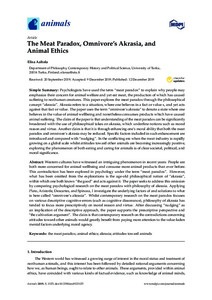The Meat Paradox, Omnivore’s Akrasia, and Animal Ethics
Elisa Aaltola
https://urn.fi/URN:NBN:fi-fe2021042823882
Tiivistelmä
Western cultures have witnessed an intriguing phenomenon in recent years: People are both more concerned for animal wellbeing and consume more animal products than ever before. This contradiction has been explored in psychology under the term “meat paradox”. However, what has been omitted from the explorations is the age-old philosophical notion of “akrasia”, within which one both knows “the good” and acts against it. The paper seeks to address this omission by comparing psychological research on the meat paradox with philosophy of akrasia. Applying Plato, Aristotle, Descartes, and Spinoza, I investigate the underlying factors of and solutions to what is here called “omnivore’s akrasia”. Whilst contemporary research on the meat paradox focuses on various descriptive cognitive errors (such as cognitive dissonance), philosophy of akrasia has tended to focus more prescriptively on moral reason and virtue. After discussing “nudging” as an implication of the descriptive approach, the paper supports the prescriptive perspective and “the cultivation argument”. The claim is that contemporary research on the contradictions concerning attitudes toward other animals would greatly benefit from paying more attention to the value-laden mental factors underlying moral agency.
Kokoelmat
- Rinnakkaistallenteet [29337]
